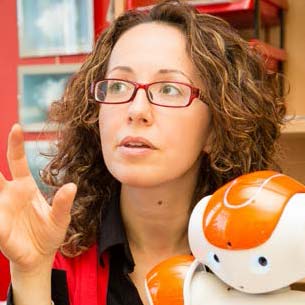Sponsors
Netherlands Institute for Research on ICT
4TU Humans and Technology
Netherlands Organisation for Scientific Research
Delft University of Technology
The Symposium
The aim of the Symposium on Interdisciplinary Insights into Group Dynamics is to kickstart collaboration in this area. We have carefully selected both computer scientists and social scientists to speak at this event on this topic and have arrange activities to facilitate active collaboration in the short and long term. There is much resources and knowledge to share and we firmly believe that there is an exciting research frontier to explore that could not be achieved by either discipline alone. Concretely, we aim to establish cohesion between these two communities at a local and international level. The way humans interact with each other has a great impact on how humans influence and collaborate. In recent years, domains in computer science such as social signal processing, affective computing, and social computing have emerged. The aim of these fields is to address the problem of how machines can perceive how humans feel and behave in order to predict and influence human behaviour. Recently, in these fields, the trends have moved from controlled lab experiments to perception in uncontrolled real life settings, leading to significant technical challenges. This is a great need to gather more data to train, validate, and test methods for behaviour perception, modelling, and synthesis. Meanwhile, in social science, many scholars have been forced to move away from behavioural studies towards surveys due to journal pressure for larger experimental data sizes. The move away from behavioral studies has been recognized as a major bottleneck for the future of social science in general. Fortunately, there still remain a number of group scholars who are actively pursuing behavioral research. Data are collected and meticulously labelled for further numerical analysis. These carefully crafted data are currently rarely made available to the general research community. However, they provide vital data for training automated methods to interpret, synthesise and influence human social behaviour.
Keynote speakers

Steve Kozlowski

Justine Cassell

Jean-Marc Odobez

Michaela Kolbe

Matthew Cronin
